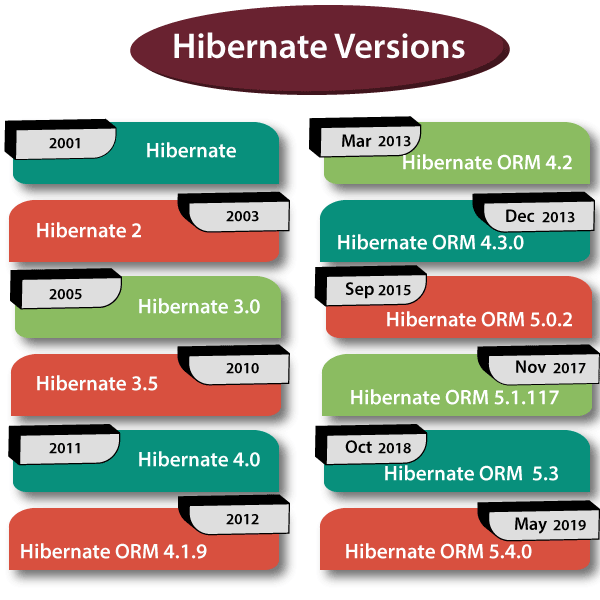Hibernate History and Versions
History of Hibernate
Hibernate was developed in 2001 by Gavin king with his colleagues from Circus Technologies. The main aim was to provide better persistence capabilities than those of EJB2, by reducing the complexities and adding some missing features.
Hibernate is an ORM (Object-Relational Mapping) tool which simplifies the application development. Hibernate provides a framework that interacts with the data stored in the database, and it is a framework for Java EE 5. Gavin King has also contributed to the design of EJB 3.0 and JPA.
Following are the versions of Hibernate:

- 2001: The first version of Hibernate was released. The main aim was to provide better persistence capabilities than those of EJB2, by reducing complexities and adding some missing features.
- 2003: The new version of Hibernate was launched that is hibernate2, which provides many improvements over the first version.
- 2005: The third version of Hibernate was released known as hibernate 3.0 with some new key features. Some features are an interceptor, user-defined filters, and Annotations of JDK 5.0.
- 2010: Hibernate 3 (version 3.5 and up) has become a certified implementation of the JPA 2.0 specification.
- 2011: The new version of Hibernate was released known as Hibernate 4.0.0 with some new features such as support, multi-tenancy, better session opening, and many more.
- 2012: Another version of Hibernate was released known as Hibernate ORM 4.1.9.
- 2013: New version Hibernate ORM 4.2 Final was released in March 2013. New version Hibernate ORM 4.3.0 Final was released on December 2013 with a new feature JPA 2.1.
- 2015: New version Hibernate ORM 5.0.2 Final was released on September 2015 with some improvements like bootstrapping, hibernate-java8, Karaf support, etc.
- 2017: In November 2017, Hibernate ORM 5.1.17 was released.
- 2018: New version Hibernate ORM 5.3 Final was released in October 2018.
- 2019: New version Hibernate ORM 5.4.0 Final was released in May 2019.
It runs on a platform known as JVM (Java Virtual Machine). Java Virtual Machine (JVM) is a virtual machine which is used to run Java programs and applications on the computer. Other language programs are also compiled to Java bytecode can be run on JVM. In other words, JVM is a virtual engine that serves the runtime environment to the Java programs and application. JVM converts Java bytecode into machine language.